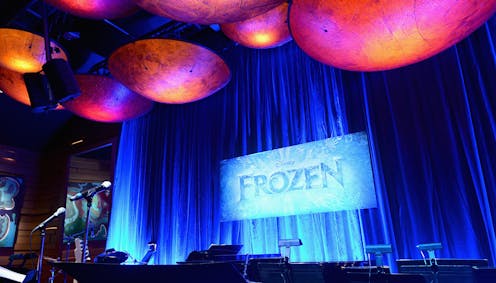Frozen offered a new way to look at Disney princesses. But the best leader was the villain
- Written by David Belgrave, Lecturer in Politics and Citizenship, Massey University

The recent release of Frozen in te reo Māori, along with the film’s impending ten-year anniversary, is putting Elsa and Anna back into focus.
Frozen’s 2013 release marked a significant shift in the way Disney told stories about princesses to explore modern gender values and a richer mix of personal anxieties.
But, in making its princesses more relatable, Disney forgot to also make them powerful and effective leaders.
Driven by their personal turmoil, Anna and Elsa forget to lead the people of Arendelle. That job falls to the film’s villain, Hans, who provides the best, albeit self-serving, example of a good leader.
Flipping the script
Unlike the Disney princesses of earlier films, Frozen flipped the audience’s expectations of the genre.
Queen Elsa did not need a romantic male partner to complete her journey and Princess Anna’s handsome Prince Hans turned out to be a villain. Love at first sight is shown to be an illusion, replaced by the power of sisterly love and self-acceptance.
Elsa’s need to break free from parental and societal expectation has found resonance in communities as diverse as those with eating disorders and Japanese kyariaūman (career women).
The LGBTQ+ community identified strongly with Elsa’s struggle and celebrated the movie’s queer subtext. In contrast, it was decried by some Christian conservatives.
Read more: Luca, Disney and queerbaiting in animation
Absent leaders
While the story retained many of the elements of Disney’s canon – royalty, magic and Anna’s romance – it also expanded the emotional experiences of Disney’s princesses to be more directly relatable to a modern global audience.
Yet Elsa and Anna’s story moves so far beyond the traditional elements of a Disney fairytale that their status as royalty is almost irrelevant to the narrative.
From the perspective of leadership, Elsa and Anna provide questionable role models.
Elsa is so afraid of what people will think of her she runs away from her own coronation. Anna’s impulsiveness is so apparent even Kristoff openly questions her judgment.
Elsa is convinced she cannot help anyone but herself. Anna gives both her hand in marriage and control of the kingdom to a man she just met.
Read more: Disney's Mulan tells women to know their place
Most of the male characters offer similarly poor examples of leadership. The Duke of Weselton is presented as a snivelling villain with a Napoleon complex. King Agnarr is a well-meaning parent but raises his daughters in isolation from their subjects and from each other.
Self-interested prince as the best ruler
The best depiction of leadership is provided by Prince Hans.
When Elsa’s magic generates an eternal winter, it is Hans who ensures the people are warm and fed. When he finds Elsa, he implores her to be better than the henchmen sent by Weselton to kill her.
Given the existential threat to the kingdom and having exhausted all other options, Hans’s decision to kill Elsa in the hope of breaking the spell and saving the kingdom is not unreasonable.
Of course, his motivations are revealed to be sinister. His good deeds were intended to fool Anna and the audience. He does not love Anna and leaves her for dead.
Read more: Who's afraid of Cruella de Vil? New stories are humanising female villains of old
Hans’s downfall comes once Anna is found alive and Elsa learns how to break the spell of winter herself. His motivations are certainly not good, but this is irrelevant from the perspective of the people of the kingdom.
Unlike Elsa and Anna, Hans is focused on the danger to the kingdom. Elsa and Anna abdicate their responsibilities in favour of their personal needs, whereas Hans tries to fulfil his personal needs by leading the kingdom.
Only when Hans is proven to be dishonest do the officials and foreign dignitaries reject him. We are not shown what the kingdom’s ordinary people think of his actions.
Inexplicably, the people of Arendelle accept Elsa’s return despite the fact she ran away and almost killed them all with her magic.
The Machiavellian approach to leadership
Hans is Machiavellian in the way most understand the term: a leader willing to do anything to achieve their goals.
However, Niccolò Machiavelli’s The Prince (1532) did not advocate for totally amoral and underhanded leadership. Instead it warned against perfectly virtuous leadership.
The early modern Italian diplomat argued successful leaders should be virtuous, but may also need to be flexible in their principles as the perfectly good will be undone by those who are not good.
[…] the way we live is very different from how we ought to live, and he who abandons the way things are done for how they ought to be done brings about his own downfall rather than his preservation: that man who wishes to be at all times good must come to grief amongst so many who are not good.
Such ideas are certainly too morally grey for a children’s story, but there are elements of successful leadership children can understand: difficult choices are inherent in life.
Real queenship (or kingship) involves personal sacrifice and a duty to the people. Disney has made princesses more than simply destined for marriage to a handsome prince, but it still needs to show princesses can truly rule as queens.
Authors: David Belgrave, Lecturer in Politics and Citizenship, Massey University




